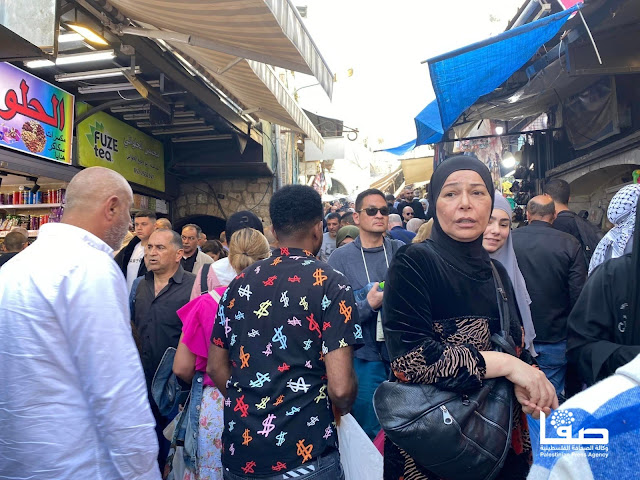With the approach of Eid Al-Fitr, the markets of the occupied city of Jerusalem are witnessing an active commercial movement, as a result of the revival of religious tourism, and the increase in the number of Palestinians, Christians, and tourists coming to the city, despite the continuous Israeli occupation attempts to stifle the Jerusalem economy.And everyone who wanders in the markets of the Old City finds it crowded with shoppers, to buy Eid supplies and souvenirs from its shops, after it suffered from a commercial and economic stagnation, due to the occupation measures and its strict restrictions on the arrival of Palestinians to the occupied city.Jerusalemite merchants are eagerly awaiting holidays and religious events in order to compensate for their losses that they incur due to the blockade and occupation measures, which aim to hit their commercial interests and increase the poverty rate in Jerusalem.
Jerusalemite trader Habib Hroub, who owns a clothing store in Al-Wad Street in the Old City, tells Safa that the commercial activity is witnessing an economic boom with the approach of Eid Al-Fitr...He explains that the prices of clothes are commensurate with the economic conditions and capabilities of Jerusalemites, indicating that Israeli malls deliberately offer "attractive offers" to Arab shoppers, with the aim of hitting the Jerusalemite economy and influencing merchants and weakening purchasing power.
Jerusalem affairs researcher Fakhri Abu Diab confirms that the occupation is working by various means to stifle the economy in the city, especially its old town, given that it is the backbone of life, so it imposes taxes on Jerusalemite merchants, and tries to reduce the number of citizens coming to the city.
Do Jewish-owned businesses not have to pay taxes?
He added, "Although the occupation is working to empty the Palestinian presence from the Old City and the vicinity of Al-Aqsa Mosque, and does not want any commercial movement in it, and is trying to impede the arrival of goods to shops, religious events come to revive its economy."The Jerusalem markets are witnessing an active commercial movement throughout the holy month of Ramadan, but it has greatly increased in the last two weeks of the holy month...What disturbs the occupation - according to the Jerusalemite researcher - is the scene of the heavy Palestinian presence in the markets of Jerusalem, who flock to it from everywhere, to shop and buy sweets and gifts, and everything related to Ramadan and Eid requirements.He asserts that revitalizing the tourism and commercial movement in the vicinity of Al-Aqsa has thwarted the plans of the occupation, which is working to empty the city of its people, strangle its economy, and increase poverty rates.

 Elder of Ziyon
Elder of Ziyon

























